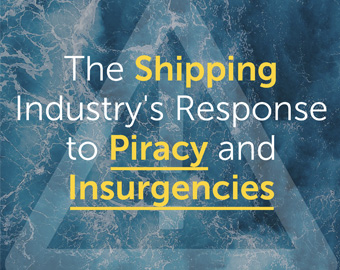Great strides in Liverpool will benefit global shipping and local economy for decades to come
04 October 2017
Guest writer: Mike Dwan, Sales Manager at Peel Ports.
Over 300 years ago, Liverpool helped to usher in a new era of international trade, with the creation of the first commercial wet dock, an innovation that saw the city become one of the world’s leading ports.
Times have changed of course, but following significant investment, Liverpool is again a vital component of the UK’s economy and a gateway to international trade.
Liverpool2 was officially opened in November last year at the Port of Liverpool by the Secretary of State for International Trade, Rt Hon Dr Liam Fox MP, creating one of the world’s most modern shipping terminals, and firmly putting the North West back on the international trading map.
The £400 million investment has paved the way to reinvent our city as a vital ocean gateway for UK importers and exporters with road, rail and canal connections linking directly to the heart of the UK mainland. From the Port, shippers can easily access a catchment of over 35 million people, almost 58% of the UK’s population.
The new deep-water facility complements our existing Royal Seaforth Container Terminal at the existing Port of Liverpool and each of our terminals now has capacity to handle around 1 million containers per annum.
The rationale behind our sizeable investment was in response to changing trading patterns and shipping industry trends towards the use of ‘mega’ ocean-going container ships. Liverpool2 is now able to handle the biggest cargo vessels in the world.
Our investment will help global shippers to transport cargo more efficiently to their end destination with lower costs, congestion and carbon emissions. Liverpool is in the right location, providing state-of-the art facilities and technology, and offers a real competitive advantage with a shorter supply chain and providing an all-water route right to the heart of the UK via the Manchester Ship Canal.
We are already exploring and succeeding in creating new opportunities for UK exporters, having signed a significant Memorandum of Understanding (MOU) to create a strategic alliance aimed at facilitating international trade and generating new business by promoting trade routes between Liverpool and the west coast of South America via the Panama Canal.

Being able to compete on the scale offered by Liverpool2 is only one aspect of how we’re transforming the port. Our real driving force is a commitment to customers, whether shipping lines or cargo owners, and helping them to achieve their business vision. As well as investing in the infrastructure and technology, we’re providing a more integrated service to our customers, whether that’s at the quayside, through port-centric logistics facilities or our wider network of ports.
The developments at the Port are complemented by our £125m investment in the national import centre at Port Salford, connected to Liverpool2 by the Manchester Ship Canal. And we have a range of other developments in place to help create a new logistics future for the North West where multimodal trade by road, rail and sea is a joined up, efficient process.
But this is only part of the picture. What we are doing is contributing to a much broader effort to ensure the continued success and prosperity of the region as a whole. Indeed, the ‘Northern Powerhouse’ initiative is of significance to the whole of the UK logistics sector and even the UK economy. Without rebalancing – creating a counterweight to the dominance of London – the UK will fail to compete fully with its international rivals. With it, we can achieve greater productivity in more of the country, while also relieving growth bottlenecks created principally by congestion and land values.
We see the Northern Powerhouse as an exciting opportunity to create a shared agenda of improving northern connectivity, prosperity, wellbeing and quality of life. Accordingly, we already work in partnership with a wide range of organisations in the public, private and voluntary sectors to deliver growth and innovation across many sectors in different parts of the North.
Apart from our own investment and our work to support the Northern Powerhouse, we have also launched the Cargo200 initiative, which aims to save cargo owners up to £400 per container and to remove 200million miles from the UK’s road and rail network over the next five years. We have already surpassed our goal to recruit 200 cargo owners, importers and exporters to support the campaign and bring about a conscious shift in how the supply chain operates, reducing costs, congestion and carbon emissions, and are now aiming to recruit additional signatories.
By working together, we can more clearly demonstrate to shipping lines the benefits of direct calls via Liverpool and create a new ocean gateway for international trade closer to the heart of the UK.
It is a bold move, but one that is in-keeping with our recent investments. It also echoes the innovation of 300 years ago. We do not look to transform global markets as we did then, but our ambition is certainly to help create a new age for Liverpool, the north-west and the whole of the UK trading economy.

Bryn Atherton, Sales Director, Allseas Global Logistics
Here at Allseas Global Logistics we’re extremely proud to support the Liverpool2 shipping terminal as part of the Cargo 200 Initiative. We believe the terminal creates the opportunity to help Northern based businesses across many sectors save on their import or exporting costs, increasing their competitiveness on the world stage.
The Northern Powerhouse concept remains a reality if the transport infrastructure is in place to support this and gives businesses across the UK the ability to reduce their environmental impact. Peel Ports is leading the way to help improve that infrastructure and help the vision become a reality.
Sign up to our newsletter
To receive bi-monthly industry updates, plus opinion and insights from our expert Logistics Consultants, sign up here.
This site is protected by reCAPTCHA and the Google Privacy Policy and Terms of Service apply.


